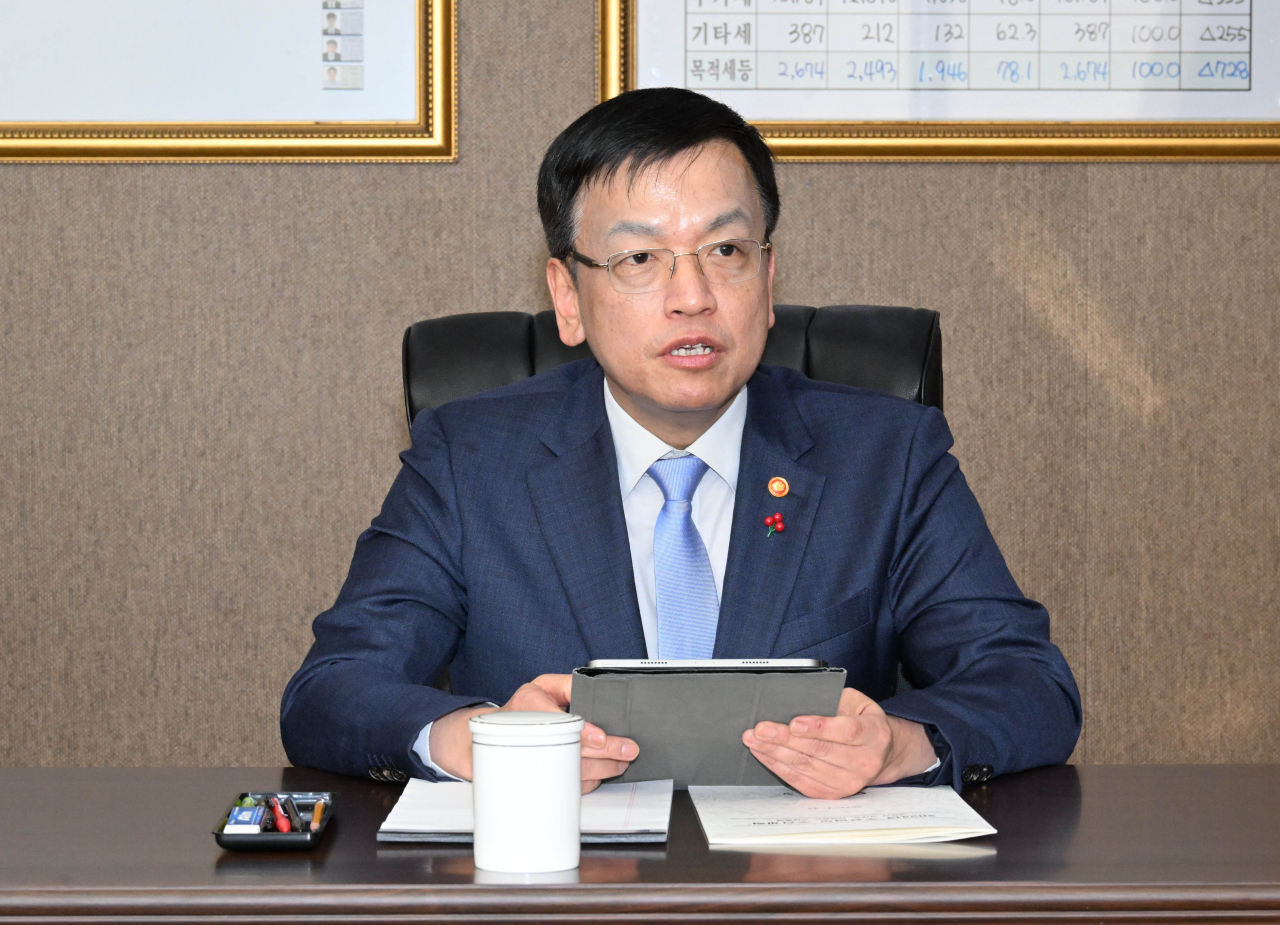 |
Finance Minister Choi Sang-mok speaks during while visiting a tax office in Seongdong-gu, eastern Seoul on Tuesday. (Yonhap) |
The Korean government plans to expand tax incentives for the nation’s strategic technologies such as advanced chips and displays as part of a tax revision that takes effect next month.
The Finance Ministry on Tuesday unveiled a set of tax reform plans, including tax cuts worth up to 950 billion won ($711 million) per year, in a bid to attract more investment into new growth drivers and boost the local economy.
The chip and display sectors have already been protected as strategic industries, but the latest revision will expand to include high bandwidth memory chips -- an advanced memory chip to support artificial intelligence -- and organic light-emitting diode displays. Korean players have secured a competitive edge over Chinese rivals in these sectors.
A set of hydrogen technologies such as hydrogen-based gas turbine production, steel-making and hydrogen storage, have been newly designated as strategic assets, given their potential as eco-friendly fuel alternatives.
The tax deduction will fall within the 40-50 percent range for small and medium-sized firms, and in the scope of 30-40 percent for larger businesses.
With Korea enjoying a boom in arms deals, the revision will also classify the defense sector as a new growth engine eligible for tax cuts. Korea shipped around 1.5 trillion won worth of arms to Poland in 2023. The tax cut range for businesses in this sector is 30-40 percent for small businesses and 20-30 percent for larger businesses.
The government will also provide further tax credits for the Korean entertainment industry to help with the production costs of creating video content.
The tax cut rate will be lifted from 3-10 percent to 5-15 percent, depending on the size of the production company.
If 80 percent or more of the production costs were spent domestically, or 80 percent of the labor costs were spent on staff members and actors in Korea, businesses would be eligible for an additional tax cut of up to 15 percent.
Under the measures, small production companies could enjoy total tax cuts of up to 30 percent. The Finance Ministry estimated that some 80-90 percent of production companies will be subject to the measure.
The ministry also said it will avoid heavy taxation on the real estate market, cutting the capital gains tax and the comprehensive real estate holding tax act on specific housing. For those who own multiple homes, the ministry said it will cut down on the additional capital gains tax of 20-30 percent for another year until May 2025. The measures will be implemented to supply more housing and stabilize the real estate economy, the Finance Ministry explained.
As companies are experiencing difficulties in running their businesses in Russia, after the country halted the tax treaty signed with nations such as Korea, Japan, the US and the European Union in August 2023 following the invasion of Ukraine, the ministry said it will also cut related taxes to avoid double taxation.
The treaty, which aims to prevent international double taxation, allowed Korean companies to enjoy limited tax rates in Russia. Related companies will not have to pay taxes exceeding the limit set by the tax treaty even though Russia has violated the treaty's terms.
But not many Korean businesses will be affected by the tax deduction as most have withdrawn from Russia, the ministry viewed.
The government will also expand the scope of deductibles for overseas dispatch expenses to businesses of all sizes. Businesses operating foreign subsidiaries with a 100 percent stake, regardless of their size, can enjoy the tax benefit.
To attract more outstanding foreign human resources, the range of foreign engineers eligible for income tax reductions will be expanded to foreign nationals who are hired as professors in special research and development zones, as well as in high-tech medical complexes. The income tax rate for those eligible will be cut to 50 percent for 10 years.
The Finance Ministry will also announce a reform on enforcement rules in March. Though the current reform of the enforcement decree was focused more on the research and development side for national strategic technologies, the upcoming revision of the enforcement rules will include further details such as the expansion of commercialization facilities.







